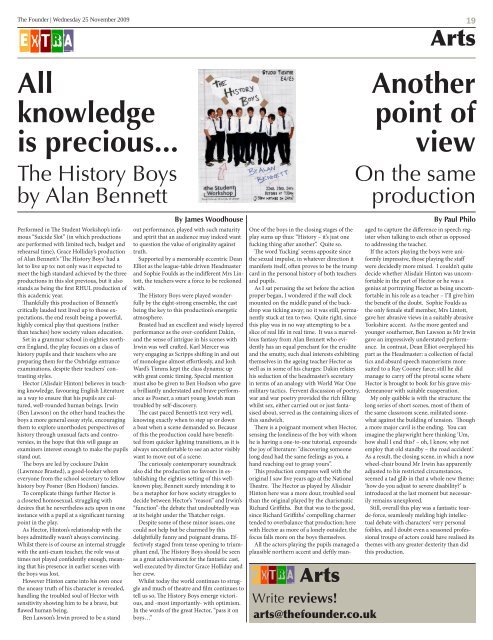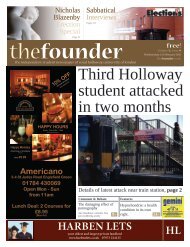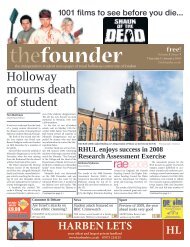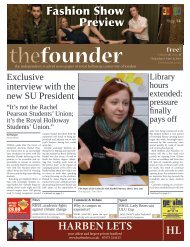Government cuts Founders' Building upkeep fund - The Founder
Government cuts Founders' Building upkeep fund - The Founder
Government cuts Founders' Building upkeep fund - The Founder
Create successful ePaper yourself
Turn your PDF publications into a flip-book with our unique Google optimized e-Paper software.
<strong>The</strong> <strong>Founder</strong> | Wednesday 25 November 2009<br />
E X T R A<br />
19<br />
Arts<br />
All<br />
knowledge<br />
is precious...<br />
<strong>The</strong> History Boys<br />
by Alan Bennett<br />
Another<br />
point of<br />
view<br />
On the same<br />
production<br />
Performed in <strong>The</strong> Student Workshop’s infamous<br />
“Suicide Slot” (in which productions<br />
are performed with limited tech, budget and<br />
rehearsal time), Grace Holliday’s production<br />
of Alan Bennett’s ‘<strong>The</strong> History Boys’ had a<br />
lot to live up to: not only was it expected to<br />
meet the high standard achieved by the three<br />
productions in this slot previous, but it also<br />
stands as being the first RHUL production of<br />
this academic year.<br />
Thankfully this production of Bennett’s<br />
critically lauded text lived up to those expectations,<br />
the end result being a powerful,<br />
highly comical play that questions (rather<br />
than teaches) how society values education.<br />
Set in a grammar school in eighties northern<br />
England, the play focuses on a class of<br />
history pupils and their teachers who are<br />
preparing them for the Oxbridge entrance<br />
examinations, despite their teachers’ contrasting<br />
styles.<br />
Hector (Alisdair Hinton) believes in teaching<br />
knowledge, favouring English Literature<br />
as a way to ensure that his pupils are cultured,<br />
well-rounded human beings. Irwin<br />
(Ben Lawson) on the other hand teaches the<br />
boys a more general essay style, encouraging<br />
them to explore unorthodox perspectives of<br />
history through unusual facts and controversies,<br />
in the hope that this will gauge an<br />
examiners interest enough to make the pupils<br />
stand out.<br />
<strong>The</strong> boys are led by cocksure Dakin<br />
(Lawrence Brasted), a good-looker whom<br />
everyone from the school secretary to fellow<br />
history boy Posner (Ben Hodson) fancies.<br />
To complicate things further Hector is<br />
a closeted homosexual, struggling with<br />
desires that he nevertheless acts upon in one<br />
instance with a pupil at a significant turning<br />
point in the play.<br />
As Hector, Hinton’s relationship with the<br />
boys admittedly wasn’t always convincing.<br />
Whilst there is of course an internal struggle<br />
with the anti-exam teacher, the role was at<br />
times not played confidently enough, meaning<br />
that his presence in earlier scenes with<br />
the boys was lost.<br />
However Hinton came into his own once<br />
the uneasy truth of his character is revealed,<br />
handling the troubled soul of Hector with<br />
sensitivity showing him to be a brave, but<br />
flawed human being.<br />
Ben Lawson’s Irwin proved to be a stand<br />
By James Woodhouse<br />
out performance, played with such maturity<br />
and spirit that an audience may indeed want<br />
to question the value of originality against<br />
truth.<br />
Supported by a memorably eccentric Dean<br />
Elliot as the league-table driven Headmaster<br />
and Sophie Foulds as the indifferent Mrs Lintott,<br />
the teachers were a force to be reckoned<br />
with.<br />
<strong>The</strong> History Boys were played wonderfully<br />
by the eight-strong ensemble, the cast<br />
being the key to this production’s energetic<br />
atmosphere.<br />
Brasted had an excellent and wisely layered<br />
performance as the over-confident Dakin,<br />
and the sense of intrigue in his scenes with<br />
Irwin was well crafted. Karl Mercer was<br />
very engaging as Scripps shifting in and out<br />
of monologue almost effortlessly, and Josh<br />
Ward’s Timms kept the class dynamic up<br />
with great comic timing. Special mention<br />
must also be given to Ben Hodson who gave<br />
a brilliantly understated and brave performance<br />
as Posner, a smart young Jewish man<br />
troubled by self-discovery.<br />
<strong>The</strong> cast paced Bennett’s text very well,<br />
knowing exactly when to step up or down<br />
a beat when a scene demanded so. Because<br />
of this the production could have benefitted<br />
from quicker lighting transitions, as it is<br />
always uncomfortable to see an actor visibly<br />
want to move out of a scene.<br />
<strong>The</strong> curiously contemporary soundtrack<br />
also did the production no favours in establishing<br />
the eighties setting of this wellknown<br />
play, Bennett surely intending it to<br />
be a metaphor for how society struggles to<br />
decide between Hector’s “reason” and Irwin’s<br />
“function”-the debate that undoubtedly was<br />
at its height under the Thatcher reign.<br />
Despite some of these minor issues, one<br />
could not help but be charmed by this<br />
delightfully funny and poignant drama. Effectively<br />
staged from tense opening to triumphant<br />
end, <strong>The</strong> History Boys should be seen<br />
as a great achievement for the fantastic cast,<br />
well executed by director Grace Holliday and<br />
her crew.<br />
Whilst today the world continues to struggle<br />
and much of theatre and film continues to<br />
tell us so, <strong>The</strong> History Boys emerge victorious,<br />
and -most importantly- with optimism.<br />
In the words of the great Hector, “pass it on<br />
boys…”<br />
E X T R A<br />
Arts<br />
Write reviews!<br />
arts@thefounder.co.uk<br />
By Paul Philo<br />
One of the boys in the closing stages of the<br />
play sums up thus: “History – it’s just one<br />
fucking thing after another”. Quite so.<br />
<strong>The</strong> word ‘fucking’ seems apposite since<br />
the sexual impulse, in whatever direction it<br />
manifests itself, often proves to be the trump<br />
card in the personal history of both teachers<br />
and pupils.<br />
As I sat perusing the set before the action<br />
proper began, I wondered if the wall clock<br />
mounted on the middle panel of the backdrop<br />
was ticking away; no it was still, permanently<br />
stuck at ten to two. Quite right, since<br />
this play was in no way attempting to be a<br />
slice of real life in real time. It was a marvellous<br />
fantasy from Alan Bennett who evidently<br />
has an equal penchant for the erudite<br />
and the smutty, such dual interests exhibiting<br />
themselves in the ageing teacher Hector as<br />
well as in some of his charges: Dakin relates<br />
his seduction of the headmaster’s secretary<br />
in terms of an analogy with World War One<br />
military tactics. Fervent discussion of poetry,<br />
war and war poetry provided the rich filling<br />
whilst sex, either carried out or just fantasised<br />
about, served as the containing slices of<br />
this sandwich.<br />
<strong>The</strong>re is a poignant moment when Hector,<br />
sensing the loneliness of the boy with whom<br />
he is having a one-to-one tutorial, expounds<br />
the joy of literature: “discovering someone<br />
long dead had the same feelings as you, a<br />
hand reaching out to grasp yours”.<br />
This production compares well with the<br />
original I saw five years ago at the National<br />
<strong>The</strong>atre. <strong>The</strong> Hector as played by Alisdair<br />
Hinton here was a more dour, troubled soul<br />
than the original played by the charismatic<br />
Richard Griffiths. But that was to the good,<br />
since Richard Griffiths’ compelling charmer<br />
tended to overbalance that production; here<br />
with Hector as more of a lonely outsider, the<br />
focus falls more on the boys themselves.<br />
All the actors playing the pupils managed a<br />
plausible northern accent and deftly managed<br />
to capture the difference in speech register<br />
when talking to each other as opposed<br />
to addressing the teacher.<br />
If the actors playing the boys were uniformly<br />
impressive, those playing the staff<br />
were decidedly more mixed. I couldn’t quite<br />
decide whether Alisdair Hinton was uncomfortable<br />
in the part of Hector or he was a<br />
genius at portraying Hector as being uncomfortable<br />
in his role as a teacher – I’ll give him<br />
the benefit of the doubt. Sophie Foulds as<br />
the only female staff member, Mrs Lintott,<br />
gave her abrasive views in a suitably abrasive<br />
Yorkshire accent. As the more genteel and<br />
younger southerner, Ben Lawson as Mr Irwin<br />
gave an impressively understated performance.<br />
In contrast, Dean Elliot overplayed his<br />
part as the Headmaster: a collection of facial<br />
tics and absurd speech mannerisms more<br />
suited to a Ray Cooney farce; still he did<br />
manage to carry off the pivotal scene where<br />
Hector is brought to book for his grave misdemeanour<br />
with suitable exasperation.<br />
My only quibble is with the structure: the<br />
long series of short scenes, most of them of<br />
the same classroom scene, militated somewhat<br />
against the building of tension. Though<br />
a more major cavil is the ending. You can<br />
imagine the playwright here thinking ‘Um,<br />
how shall I end this? – oh, I know, why not<br />
employ that old standby – the road accident.’<br />
As a result, the closing scene, in which a now<br />
wheel-chair bound Mr Irwin has apparently<br />
adjusted to his restricted circumstances,<br />
seemed a tad glib in that a whole new theme:<br />
‘how do you adjust to severe disability?’ is<br />
introduced at the last moment but necessarily<br />
remains unexplored.<br />
Still, overall this play was a fantastic tourde-force,<br />
seamlessly melding high intellectual<br />
debate with characters’ very personal<br />
foibles, and I doubt even a seasoned professional<br />
troupe of actors could have realised its<br />
themes with any greater dexterity than did<br />
this production.














